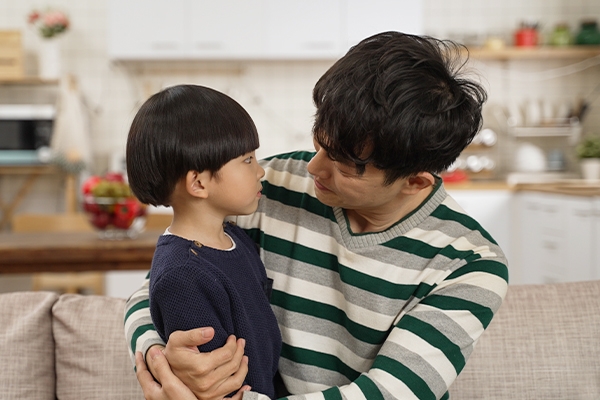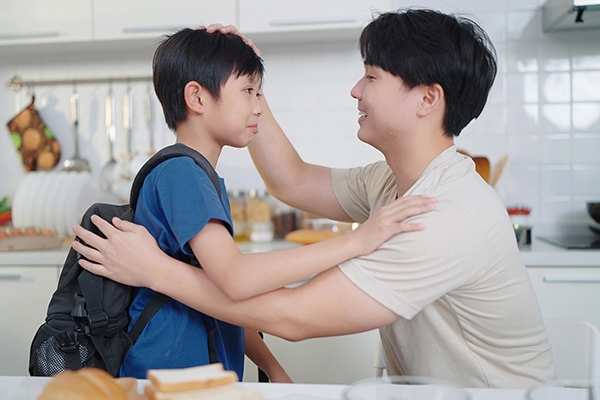Listen And Pay Attention To Your Children

Not every parent understands the importance of listening to their child. The majority of them, instead of listening, nag. What kind of parent are you to your child? Here's how things work.
Giving your children your time and attention shows them that you appreciate and accept them for who they are. This increases self-esteem, independence, and confidence. Listening also allows youngsters to communicate openly and safely about their hopes and obstacles.
Unfortunately, many parents dislike hearing their children complain. Hear yet do not listen. When their child makes mistakes, parents' attention is frequently diverted from their child's words. It is difficult for parents to accept their children's explanations. Instead of listening, what frequently occurs is blaming.
Listening to children is the same as teaching them how to communicate well. It also implies that you are concerned about their mental state. Children can have positive interactions with their families and their surroundings if they can communicate well.
How to listen
Open communication between parents and children keeps them away from bad environmental influences. The formation of communication from an early age teaches youngsters to tell their parents about their experiences or sentiments. This makes it easy for parents to monitor their adolescent's social interactions later in life.
From a parent's perspective, I know it's not easy, but that doesn't mean we can't try. These are some suggestions.
1. Make time to talk

Make the time to talk to your child without interruptions. Leave your devices and busy life behind for a bit to devote time to your child, both mentally and physically. Assure them that you are completely focused on them. Use simple words so they can grasp what you're saying.
Spend time doing activities together, such as going for walks, eating meals, or dropping them off and picking them up from school. However, keep your attention on the talk rather than the activities.
2. Be accessible

Have an open mind. Children might incite your rage, fear, and anxiety, but you need to be patient. Accept all emotions without being anxious, sad, angry, or frustrated. Remember that youngsters lack the maturity that you do. Consider what is good to do if you were in your child's position.
3. Listen carefully

Let your child finish their sentence before reacting. Never meddle, and always respond tactfully. Show interest in what they have to say by being curious. Learn about their perspectives and what they're trying to say on the subject.
4. Don't pass judgement

When listening to your child, try not to be judgmental. Because childhood is a difficult time, your child may struggle to express their emotions. Because of their limited vocabulary, what they say is frequently misconstrued.
Never criticize, judge, or blame something your child says. While a speech is one approach to making your argument, genuine conversations stimulate teamwork and problem-solving.
Why do we need to listen?
Research shows that listening to children makes them listen to you too. Children will try to absorb and understand what their parents say. Of course, since they feel appreciated. Here are some of the advantages of listening to children vent.
1. Strengthen your bonds with them
Actively listening to your child demonstrates that you value what they have to say. This instills confidence, fosters trust, and contributes to a closer link with you.
Listening patiently to them, actively engaging in discussion, and giving them enough space to express themselves can allow your child to express himself.
2. Help children with communication
Children will feel appreciated if their parents are willing to listen to their stories. As teenagers, this will make it simpler for them to share their stories with you.
3. Improve social skills
They will learn to create positive social ties if you listen. Communicating with youngsters becomes an exercise in teaching them that speaking is just as vital as listening. These abilities help children cooperate more effectively in their social interactions.
4. Build up the self-worth
Children understand the value of your time and attention. Giving them your time and attention makes them feel important. They will believe that they are your first priority. These emotions will later lead to their becoming self-assured adults.
5. Provide possibilities for improved academic performance
Caring and understanding parents can boost a child's chances of finishing their homework by up to six times, especially if the child is struggling in school.
Listening also aids your child's process of dealing with anxiety and trauma. When you sit down with them and discuss anything painful, you open the door to further discussion. This will help your child cope better with the event.
6. Promotes emotional awareness
According to a study, families who spend time together without the distractions of cell phones and technology raise well-adjusted children. They also had lower levels of despair and anxiety throughout their lifetimes.
Having trouble listening to your child? Try to be patient as they rant. Smile and laugh with them as they tell delightful stories. When they appear to be sad, give them a warm hug.



